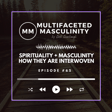Become a Creator today!Start creating today - Share your story with the world!
Start for free
00:00:00
00:00:01

How to Passionately Disagree and Strengthen a Relationship | Ep. #9
It would be an understatement to say we as a society is at a place where it's hard to have a conversation with someone you disagree with. You may be surprised by the outcome if you're willing to approach those conversations with a different lens and softer heart posture.
URL's
Host: JoshCearbaugh.com
Podcast: MultifacetedMasculinity.com
12 Week Course: Jumpstartyourlife.com
Free 15 Minute Consultation: Click Here
Transcript
Understanding Masculinity in Relationships
00:00:00
Speaker
Men, we are not simple, chest-thumping, rock-smashing, fire-starting barbarians. We have depth. We intensely feel. We are scared, yet brave. We love to have fun. We're imperfect and make mistakes. We're compassionate and loving. We are multifaceted. Let's explore the reality of masculinity together.
Navigating Difficult Conversations
00:00:29
Speaker
Have you ever had a conversation with a friend where you walked away feeling just absolutely frustrated or maybe even a spouse that by the time the conversation was over, you don't even know where the relationship is? Well, that's what we're going to be diving into in today's conversation.
00:00:48
Speaker
is how to do that in a way where by the end of the conversation, you don't hate one another. Matter of fact, you might even appreciate the other person's side of you or like them more or who knows, maybe even learn a thing or two. And so without further ado, let's dive into today's topic.
00:01:21
Speaker
All right, today's topic could be a touchy one for some people. We're talking about disagreeing, but doing it in a way that can actually strengthen a relationship rather than unfortunately what it's doing for a lot of people, which is creating disconnection or arguments or blowups, whatever it may be. And believe it or not, there's a way to disagree and still maintain the relationship.
00:01:46
Speaker
Now obviously it's on both sides that need to kind of engage in some of these things and I think that the first thing and probably the most important one is the relationship should be more important to you than whatever that topic is that you disagree on. I mean it is impossible to agree on all points with another individual. It's just impossible. I have a lot of friends that fundamentally disagree with me on a variety of topics
00:02:15
Speaker
I mean, I had one friend that I met for coffee every week. And we, if there was two sides of a coin, we would be approaching the topic looking at the opposite sides. But he was one of my closer friends. And what it was is that I valued his lens on whatever that topic was for a variety of reasons. And we'll get into some of those. But the starting point was
Social Media's Impact on Communication
00:02:41
Speaker
I cared more about our relationship than whatever that topic was that we disagreed on. One point real quickly, if you are offended by the Facebook rapid fire comments or social media comments in general, there's no relational equity there. There's not a relationship to hold onto and maintain.
00:03:01
Speaker
So it's much easier to let those kind of bounce off of you and not confront or challenge you at such a deep and intimate way. If it is, then that should be something that you pause and take inventory internally of like, why is it that a written comment by someone, whether you know them or not, is affecting you so deeply. As far as communication, another breakdown that you have when it comes to social media specifically,
00:03:25
Speaker
is the format that it is. You know, it's written communication. If it's Twitter or whatever it may be, it's really short. And most people don't take the time to put together an entire thought in a matter of couple sentences. In most topics, you can't cover in a couple sentences, can you?
00:03:42
Speaker
So specific to social media, you have to be willing to understand that most people are not going to be able to accurately convey what they really truly believe about a topic when they're just throwing out a reactionary comment or whatever it may be.
00:03:58
Speaker
But just in general, over 80% of communication is normally conveyed in body language, in tone of voice, in your eye contact, and so on. And so when you have something that's like social media, you are literally reading that content in the lens that you choose to put on just those words.
00:04:16
Speaker
And you're doing that without taking into consideration all of the other aspects of communication that really make up an individual's ability to communicate something with their heart behind it.
Constructive Communication Techniques
00:04:28
Speaker
So just keep that in mind when you are engaging on social media. Another big point to be aware of is be slow to react.
00:04:37
Speaker
And one of my favorite analogies that I heard years ago is the whole thing of don't flinch, right? And the guy that was teaching at the time, he literally said, well, he jumps into a cold shower to learn how to just take some deep breaths and not flinch in the physical, natural, but then he also
00:05:02
Speaker
use that to not flinch. This doesn't mean like stand your ground. It's being willing to pause for a moment and take in what the other person's saying and not just throw out your opinion right away. So the more that you can be slow to react and you can control that, the more you're setting yourself up for success to be able to communicate in a way that is not that knee-jerk reaction
00:05:30
Speaker
Because the more that you're able to convey your side of things out of a non reactionary state, the better you will be able to get your point across and the better chance that you have for the other person to actually hear.
00:05:47
Speaker
what your heart really wants to say. It's really hard when you're white hot with emotion to say what you deep down inside believe because when you communicate out of a reaction then it's what you feel that you need to do to either defend yourself or if you're feeling hurt or unseen etc.
00:06:09
Speaker
So slow down, take a moment before you react, and control the pace of the conversation in a way where it's not just building on itself and escalating to a point where it's destructive and creates division instead of connection. I don't know about you, but it can be hard to want to be fully present with someone
00:06:33
Speaker
who you fundamentally disagree with. But again, we're going back to the point of how do you disagree and either maintain or strengthen a relationship. And one of the ways that you do that is you actually sit down and you listen to what that other person is saying. Sometimes it's not on them, it's on you. Because if you're not actively listening or fully present,
00:07:01
Speaker
If you're either thinking about your to-do list or how about this one, if you're thinking about your response before they're even done talking, then a lot of times what happens is you jump to a conclusion or an assumption and you don't take the time to really listen. And so one of the most effective things I've learned how to do is just clarify what the other person's saying. So I've had several conversations where if I didn't just take those 10 seconds to reflect what that person is saying and just clarify,
00:07:31
Speaker
We could have gone down an entire different path in the conversation that could have easily been prevented if I would have just literally taken 10 seconds to say, are you saying that? Because I've had several times where they, you know, they reply with, well, no, that's not what I'm saying. What I'm trying to say is.
00:07:52
Speaker
And sometimes, especially if you're talking to somebody who's a verbal processor, they need to communicate their point a few different ways to finally land on the point that they really mean. So if you know that you're in a relationship with a verbal processor, you need to give them space to say something that they don't even fully mean to arrive at that point.
00:08:16
Speaker
And one way you do that is you reflect back to them, you know, did you mean, did you mean this or
Finding Common Ground in Disagreements
00:08:22
Speaker
did you mean that? Okay. The way that you're communicating right now is saying X, Y, or Z. Is that really what you mean? And you give space for them to either say, you know what? Yeah, that's exactly what I mean. Or no, that's not what I mean at all. And let them expand on that point. And there's always going to be things that you disagree on.
00:08:42
Speaker
But most of the time, if you take any topic that's a hot topic, you can find common ground if you're willing to look for it. If you approach a conversation where it's black and white, right and wrong, you're going into it on guard and defensive
00:08:59
Speaker
and reactionary, it's really hard to find that common ground. But if you go into a conversation saying, you know what, I really care about that person, I'm gonna pause and reflect and echo back to them what they're saying to make sure that our point's right, to make sure that we're on the same page with the point that we're talking about, and I'm gonna look for that common ground, what you're doing is you're helping them lower their guard. Because more than likely, if it's a hot topic, they're putting up their defenses as well.
00:09:28
Speaker
and feeling a need to quote-unquote go to war. When you find that common ground and all of a sudden they don't feel like they have to be on guard, they can actually start to articulate their point a little bit clearer because it's not as hostile because you're looking for areas that you agree on. And when you find them, highlight it. Lead with that. Even if you disagree with a certain aspect of a conversation,
00:09:53
Speaker
lead with the point that you can find that helps diffuse that defensive posture. Let's pick a hot topic real quick. Let's go with gun control. That's a hot topic. Now, I'm a former Marine. I own guns. I personally believe in the Second Amendment. And yet, people that are anti-gun, I've had really interesting conversations with them.
00:10:19
Speaker
because they could believe that you should take away all the guns and give certain examples and all kinds of stats, but then in that they say one or two things that I agree with. Let's just say the need for better background checks as an example, where if somebody is either emotionally unstable or psychologically unstable, they should not have a gun.
00:10:42
Speaker
Okay, great. I agree with that point. I agree that if somebody has schizophrenia, they probably shouldn't be going out and buying an AR-15. And so I could disagree with a lot of their points, but if I start my response with, you know, I really do agree that people that have mental issues shouldn't own a gun. And you start with that point and then expand on, personally, I think that it's okay to have a gun XYZ for my reasons.
00:11:11
Speaker
Right? But if you can find that common ground, then you can maintain connection relationally because you're not on that black and white right and
Curiosity vs. Justification in Disagreements
00:11:20
Speaker
wrong. I'm on my side of my fence and you're on your side. And we're basically just lobbying grenades at one another. Another point to consider is don't feel the need to justify your position. A lot of times if you feel that you feel like, you know what? I need to make sure that they understand my side of things.
00:11:41
Speaker
A lot of times all that's doing is exposing an insecurity in yourself. It actually has nothing to do with them because when you're okay with you, then you're not putting yourself on trial in the sense of who you are related to a certain topic. It makes it a lot lower stakes when you don't have to rest your identity on being right. You know, when I, when I'm in a conversation with somebody who I disagree with,
00:12:06
Speaker
And all of a sudden they feel this deep seated need to justify their position and basically build a case to make sure that they're right and I'm wrong. What it communicates to me is they're really insecure. You know, one other possibility is that as a child, they weren't really heard and validated. And that circles back to that common ground where when you can find that common ground, really what you're doing, if it's that latter point,
00:12:31
Speaker
is you're validating them. If you're talking to somebody who is insecure, you show strength as a man to not be shaken in who you are, given that topic, and be willing to validate their side of things, even if you disagree. Because when they feel validated, they don't feel the need to emotionally kick and scream to have their point heard. But it's really hard to do that when you're feeling like you have to justify your side of things. Okay, here's a point that might be challenging for some of you.
00:13:01
Speaker
be willing to be wrong. It's really immature to approach hot topics assuming that you are always right because you're not. And I don't know about you, but even things that I thought that I was right in or in the right
00:13:18
Speaker
in a certain topic 10 years ago, I don't necessarily even agree with myself because I've grown and matured and become more educated and had life experiences. Think about it this way. If you had a conversation with the version of yourself 10 years ago, then where you are now, would you agree with everything that that person believed? Probably not. You would probably find yourself being wrong in certain belief systems
00:13:44
Speaker
Not because you're a bad person or malicious or anything, but because you just didn't have the education or life experiences to better understand where that common ground is or that gray is. You know, most of us run around with essentially horse blinders on, where we're only seeing the tunnel vision of what our life has shown us. That's why a lot of times when you get people that have traveled around the world, they're a little bit more well-rounded.
00:14:10
Speaker
Not because they're a better person, but they've been exposed to different cultures or different experiences in their life that helps them understand that a lot of times it's just different. It doesn't mean necessarily right or wrong. Certain experiences they've had highlights the point that, you know what, I believe this growing up, but I don't exactly agree with that anymore. So be willing to be wrong.
00:14:34
Speaker
You know, I've been called on things where if I came into it with the mindset of I'm right, I would not have grown
Growth Through Admitting Mistakes
00:14:41
Speaker
as an individual into who I am today. My point is be willing to be wrong. And again, if any of these points that we're covering, you feel the need to justify in and of yourself or push back on, then it may be an area that shows your own insecurity and may be worth exploring. Why is being right or being justified or finding the common ground?
00:15:04
Speaker
or active listening, what is it within these points that causes such a strong response? What if you became curious instead of angry? This has been one of the more impactful changes that I've made to become curious instead of angry. It's really hard to be curious and be angry at the same time. It's kind of like it's really hard to be curious and be afraid at the same time. Curiosity is such a powerful tool to use in life.
00:15:33
Speaker
I mean, when we were kids, we were super curious, but as adults, we start to become less curious and we start to deal with anxiety or fear or anger more and more. There's a lot tied into that, but when it comes to disagreeing with somebody, I just, I let myself be fascinated by the other person's
00:15:53
Speaker
life story that has brought them to the point that they believe something that I disagree with. And so instead of being angry, I just tell me more about that. Wow. And where did you learn that? What kind of religion did you have growing up? Like begin to probe into the individual instead of the topic. Because a lot of times if you take the time to better understand the individual, then their lens on something makes more sense.
00:16:20
Speaker
And when you're curious instead of angry, you can better understand maybe why someone believes a certain way. So using curiosity instead of anger as an internal approach to a topic that maybe you disagree with,
00:16:36
Speaker
It can lead to a really productive and sometimes enlightening conversation with somebody. If you take the time to pause, listen to the individual, echo back, find the connection points that you can find the common ground, apply some of these things. You walk away from a conversation where you disagree, but that relationship is stronger because of it.
00:16:56
Speaker
because you're not having to feel justified or stand your ground. And my last point is there's just going to be times where you disagree, and that's okay. You know, it's been really interesting with my oldest son, he's almost 11, and we started to have these conversations around politics or emotions, just a deeper level of conversation.
00:17:20
Speaker
And there are some things that we just disagree on. And what's funny is there's been times where he has said to me, well, dad will just agree to disagree. Like, yeah, that's right. We will, son. Because even if you fundamentally disagree with me on certain topics, my love for him and my relationship with him will always be more important than having him need to agree with me for connection to maintain between us.
00:17:48
Speaker
And so sometimes once we've really fully flushed out a certain topic and we're still at a place where we don't agree, we land on, you know what, we'll agree to disagree.
00:18:01
Speaker
So point being is you can always find common ground on any topic, even if that common ground is, I agree to disagree. Maintaining connection in relationship. I don't know about you, but it feels like it's been hard because of our society and our political environment.
Maintaining Connections Amidst Disagreements
00:18:21
Speaker
I mean, even down to the pandemic that we're going through right now.
00:18:25
Speaker
It seems that you're on one side or the other, right? You're either, I'm gonna fight for my rights and not wear a mask, or I'm gonna be the side that is, you're being irresponsible and I'm gonna wear my mask, et cetera. Even in that, we've become divided.
00:18:41
Speaker
And if you let every topic that someone disagrees with you become a factor of disconnection, what you're gonna find is as life goes on, you're gonna have less and less people feel like they can really fully be themselves. Because when somebody disagrees with you, they don't feel like it's safe to express their opinion because they know. If I share my opinion, it's either gonna turn into an argument or I'm gonna be belittled or looked down on, dismissed, whatever that may be.
00:19:11
Speaker
Man, it's time to grow up. It's time to mature enough to where disconnection isn't the end result if you disagree. Are you able to do it? Are you able to find a topic that you disagree on? Try it this week. Try to find a topic this week that you disagree on you intentionally bring up and try to navigate it different than you have and see if you get a different result. I can guarantee you that the outcome
00:19:36
Speaker
will be better if you're willing to make the relationship mean more to you than the topic. And be willing to be man enough to be wrong sometimes. Be willing to let go of the need to be justified.
00:19:53
Speaker
All of those things are signs of maturing and our society so desperately needs it right now. So we'll end this with a simple question. Will you be one of the men that's willing to walk away from a disagreement with a better relationship than when you started the conversation?









